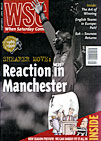 Following Alan Shearer's move to Newcastle, Premier League clubs have more talent than ever before
Following Alan Shearer's move to Newcastle, Premier League clubs have more talent than ever before
Alan Shearer has made a habit of living up to his billing: the two thirty-yard strikes on his Blackburn debut that accompanied the Crystal Palace chant of “what a waste of mon . . .”; the goal on his England debut against France; the five he notched in Euro ’96; leaving Blackburn the month he appears on the front cover waving at Kevin and Alex. £15m is a hell of a price tag, but if anyone can handle it and deliver 30 goals a season, then Al’s the boy.
Whether he will quite be able to make the difference for Newcastle remains to be seen; a lot will depend on his defensive team-mates (if he has any).
There is a very real possibility, though, that this could be a fantastic season for the Premiership spectator, in the flesh or in the pub, as we watch to see if he can deliver. So many teams now have players who, if unable to carry a club for a season, are abundantly able to turn an afternoon. This suggests that it may be hard for any team, however good, to avoid succumbing to the skills of a talented individual, be it Di Matteo or Vialli against Chelsea, Juninho or Ravanelli against Middlesbrough, or Sharpe, Cole, Jordi Cruyff and Neville the Even Younger against Manchester United reserves.
There is an American dessert that goes under the name ‘Death by Chocolate’. This will come to mind every Sunday, Monday and Tuesday on the new season when the team lists from the ‘weekend’ games are printed, as much for who’s not there as who is. It will probably be possible each week to pick a non-playing side who could take on all-comers, languishing on the bench or in the stiffs.
This might be an appalling waste of talent. Unless Kev intends to throw Asprilla, Beardsley, Ferdinand, Ginola, Gillespie and Shearer onto the pitch simultaneously, then when everyone is fit, someone who is worth paying to see by themselves will miss out.
As will be pointed out time and again during the season ahead, the money spent on paying internationals to warm the bench could have been used to expand grounds, cut prices, and to pension off Bob Wilson. Instead, it will keep the tabloids in My (wherever) Hell stories for months. And, with a pleasant regularity, sides with more talent than a whole series of Stars in the Eyes will lose, often quite badly.
So many teams will start this season with their eyes on at least a European finish, probably more than at any time since Heysel. After all, they’ve bought big, and are building on a reasonably good season. Four sides were within five points of the last UEFA Cup place in May, and below them were West Ham, Chelsea and Middlesbrough, who were all pretty happy. Leeds and Coventry haven’t been transfer wallflowers, either.
The amount of genuine optimism to be found amongst the Premiership pundits in this edition is not surprising, and there is probably much more of it than would have been the case a year ago, even though only four people are talking about realistically finishing as champions.
With personal exceptions relating to ancient playground wrongs, we’ll have a lot of sympathy for those supporters whose seasons fail to live up to great expectations. Lurking at the back of their minds will be the fear that if it does all go wrong, then they will pick up the tab in the long run.
There is another dark cloud looming, too. The Laws of the game have been subject to many changes in recent years. Those which have had most attention have been the ones intended to restrict the freedom to maim and to produce more goals. Of lesser note, or perhaps of an unrecognized significance, have been the shenanigans regarding the use of substitutes, which may have had the effect of cancelling out these other changes.
For a while, there was the twelfth man, then number 14 arrived, and now the spare keeper as well, with the possibility of naming five alternative men in some competitions. If something goes wrong, you have a good chance of having someone on the bench who can correct the problem. Now you can even replace a sent-off goalkeeper with someone who knows what he’s doing.
In the 1966 World Cup, it wasn’t even possible to have Jimmy Greaves by himself on the bench. In Euro ’96, your entire squad could be called upon. But not, crucially, using free substitution. Yet that is the long-term danger which the mass arrival of the super-squads threatens. Silvio Berlusconi once said that: “In the Champions Cup you run the risk of many hazards: rain, refereeing, bad luck and the risk of first round elimination. It’s not modern thinking.” The appalling possibility is that the wasting of all these millions on players who can’t be used at will may lead to calls for more Champions-League-style ‘modern thinking’. (We wouldn’t be in the least surprised if such calls emanated from the North East, should Sir John’s boys fail once more.)
The British men’s hockey team in the Olympics featured a player, Calum Giles, whose sole task was to come off the bench to take strikes at goal at penalty corners. The day football is permitted its own equivalents of Calum Giles is the day we start a tiddlywinks magazine.
From WSC 115 September 1996. What was happening this month